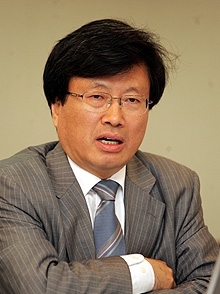 |
Kim Hyung-gi, Professor of Economics at Kyung-buk University
In his comments regarding the defeat of the ruling Uri Party in the May 31 local elections, President Roh Moo-hyun said, "losing an election or two does not change history." Elections are indeed events quite dependent upon the contemporary political situation, and subject to the whims of incidental events. However, this election is different, as it may in fact be a history-changing event.
Shouting all the while that the Roh administration is an incompetent, pro-North Korean, left-wing regime, and that the elections were an occasion for the electorate to judge the central government, the Grand National Party (GNP) achieved an overwhelming victory. Meanwhile, the Democratic Labor Party (DLP), calling for a change in government and serving as the representative force of progressive reform, failed to elect a single local leader. They even lost two district leader seats in their stronghold of Ulsan.
Where has public sentiment gone since the April 15 general elections of 2004, when the people saved President Roh from impeachment, gave the Uri Party a majority in the legislature and catapulted the newly born DLP into the third-party slot? What allowed the GNP to sweep the national stage despite the negative labels previously placed upon them due to incidents of corruption and their political impotency?
The hearts of the people have left the Roh administration and the Uri Party, and the hearts of the workers have strayed from the DLP. The Democratic Party showed electoral success only in the province of Kwangju-Chonnam. Has the people’s preference thus shifted to the GNP? Simply because the votes tended towards the GNP, one cannot interpret this as evidence for a shift in their preferences. After all, their shift was not because of their partiality for the GNP, but rather their dislike for the Uri Party and their rejection of the DLP’s proposals. How did the Roh Administration and the Uri Party lose the hearts of the people? It is because despite calling for reforms, they left the common people to suffer. They supported policies far removed from the sentiments of the electorate, and promoted narrow-minded and arrogant figures within the party. Diplomatically, they plotted a left-wing course, thus causing discomfort among the populace, and economically, they promoted neo-liberalism, thus hurting the middle and working classes. Finally, they emphasized far-flung long-term economic reforms, despite continuing economic stagnation, while showing negligence towards public welfare policies. Why did the hearts of labor leave the DLP? It is because they presented unrealistic policies and took combative measures that did not match with the sentiments of the people. They attached themselves to an ideology exclusively centered on workers, far removed from the actual lives of the citizenry. Lastly, they were trapped in the failed and outdated framework of liberalism and failed to promote a new vision of progress that the people could cling to. One must not overlook that in the background of the election failures of the Roh administration, the Uri Party, and the DLP lies the loss of confidence in progressive labor movements and civic groups. After all, the popular base of the DLC is the Korean Federation of Trade Unions, and many important positions within the Roh Administration are filled with figures from the civic groups. Though having contributed to the humanization of workers, the labor movement was criticized for not considering the future of the nation’s economy and the stances of citizens and consumers. Their policies of clinging to old left-wing ideologies, their rejection of dialogue between management, government, and labor and their single-minded promotion of labor strikes isolated them from the people. As their movement is centered on regular contracted workers in large industries, the majority of unaffiliated irregular workers disregarded them. Civic groups, which brought about democratization, the humanization of labor, and transparency in government, have lost most people’s trust through their lopsided manner of accentuating fairness and ignoring efficiency, stressing democratization while not considering social order, and emphasizing environmental protection while neglecting economic development. The people have turned their back on these groups because, though they are strong in illuminating problems and staking their opposition, they are weak in presenting rational solutions. The May 31 local elections acutely showed us the people’s disaffection with the progressive reform forces. The moment of crisis for these forces is drawing near near. If they cannot overcome this predicament before the fierce conservative-progressive clash of the 2007 presidential election takes place, the 10 years of rule by democratic reform forces may indeed give way to a conservative resurgence. In order to conquer this crisis, the progressive reform forces must concretely answer the people’s questions in regards to how they will put food on the table and how they will rescue the economy. Suffering from the effects of neo-liberalism, the lower and middle classes must reflect on why they support its opponent, the GNP. New development and welfare policies for improvement of people’s standard of living must be set forth. Rather than the outdated high-cost and low-efficacy liberalism of yesterday, a sustainable set of low-cost and high-efficacy reforms must be presented. Holding the reigns of power as they are, the President and the Uri Party especially must take responsibility for the resolution to the crisis that the progressive reform forces are facing. Rather than making technical changes to the engineering of their political style, they must regain the hearts of the people through fundamental policy shifts built through deep reflection on their losses and by a reorganization of their ranks. Above all else, the President must not only read the flow of public sentiment, but also humbly obey it and work to ease the pain of the lower and middle classes.





